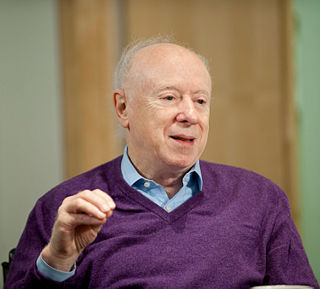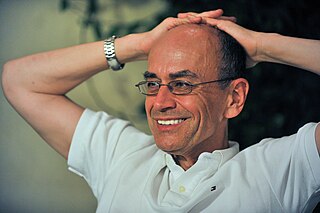Related Research Articles

The University of California, San Francisco (UCSF) is a public land-grant research university in San Francisco, California. It is part of the University of California system and it is dedicated entirely to health science. It is a major center of medical and biological research and teaching.

Stanley Benjamin Prusiner is an American neurologist and biochemist. He is the director of the Institute for Neurodegenerative Diseases at University of California, San Francisco (UCSF). Prusiner discovered prions, a class of infectious self-reproducing pathogens primarily or solely composed of protein. He received the Albert Lasker Award for Basic Medical Research in 1994 and the Nobel Prize in Physiology or Medicine in 1997 for prion research developed by him and his team of experts beginning in the early 1970s.
A fellow is a broad concept whose exact meaning depends on context. In learned or professional societies, it refers to a privileged member who is specially elected in recognition of their work and achievements. Within the context of higher educational institutions, a fellow can be a member of a highly-ranked group of teachers at a particular college or university or a member of the governing body in some universities ; it can also be a specially selected postgraduate student who has been appointed to a post granting a stipend, research facilities and other privileges for a fixed period in order to undertake some advanced study or research, often in return for teaching services. In the context of research and development-intensive large companies or corporations, the title "fellow" is sometimes given to a small number of senior scientists and engineers. In the context of medical education in North America, a fellow is a physician who is undergoing a supervised, sub-specialty medical training (fellowship) after having completed a specialty training program (residency).

Michael Ellis DeBakey was an American vascular surgeon and cardiac surgeon, scientist and medical educator who became the chancellor emeritus of Baylor College of Medicine in Houston, Texas, director of the Houston Methodist DeBakey Heart & Vascular Center, and senior attending surgeon at Houston Methodist Hospital in Houston, with a career spanning 75 years.
A postdoctoral researcher or postdoc is a person professionally conducting research after the completion of their doctoral studies. The ultimate goal of a postdoctoral research position is to pursue additional research, training, or teaching in order to have better skills to pursue a career in academia, research, or any other field. Postdocs often, but not always, have a temporary academic appointment, sometimes in preparation for an academic faculty position. They continue their studies or carry out research and further increase expertise in a specialist subject, including integrating a team and acquiring novel skills and research methods. Postdoctoral research is often considered essential while advancing the scholarly mission of the host institution; it is expected to produce relevant publications in peer-reviewed academic journals or conferences. In some countries, postdoctoral research may lead to further formal qualifications or certification, while in other countries, it does not.

Barry James Marshall is an Australian physician, Nobel Prize Laureate in Physiology or Medicine, Professor of Clinical Microbiology and Co-Director of the Marshall Centre at the University of Western Australia. Marshall and Robin Warren showed that the bacterium Helicobacter pylori plays a major role in causing many peptic ulcers, challenging decades of medical doctrine holding that ulcers were caused primarily by stress, spicy foods, and too much acid. This discovery has allowed for a breakthrough in understanding a causative link between Helicobacter pylori infection and stomach cancer.

The Lasker Awards have been awarded annually since 1945 to living persons who have made major contributions to medical science or who have performed public service on behalf of medicine. They are administered by the Lasker Foundation, founded by Albert Lasker and his wife Mary Woodard Lasker. The awards are sometimes referred to as "America's Nobels".

Rosalyn Sussman Yalow was an American medical physicist, and a co-winner of the 1977 Nobel Prize in Physiology or Medicine for development of the radioimmunoassay technique. She was the second woman, and the first American-born woman, to be awarded the Nobel Prize in Physiology or Medicine.

Joseph Leonard Goldstein ForMemRS is an American biochemist. He received the Nobel Prize in Physiology or Medicine in 1985, along with fellow University of Texas Southwestern researcher, Michael Brown, for their studies regarding cholesterol. They discovered that human cells have low-density lipoprotein (LDL) receptors that remove cholesterol from the blood and that when LDL receptors are not present in sufficient numbers, individuals develop hypercholesterolemia and become at risk for cholesterol related diseases, notably coronary heart disease. Their studies led to the development of statin drugs.

Sir Paul Maxime Nurse, is an English geneticist, former President of the Royal Society and Chief Executive and Director of the Francis Crick Institute. He was awarded the 2001 Nobel Prize in Physiology or Medicine along with Leland Hartwell and Tim Hunt for their discoveries of protein molecules that control the division of cells in the cell cycle.
The Albert Lasker Special Achievement Award is one of the four Lasker Awards given by the Lasker Foundation for medical research in the United States. The first award was given in 1994; it is not awarded every year. In 2008, the award was renamed the Lasker-Koshland Special Achievement Award in Medical Science in honor of Daniel E. Koshland Jr.

Charles David Allis is an American molecular biologist, and is currently the Joy and Jack Fishman Professor and head of the Laboratory of Chromatin Biology and Epigenetics at The Rockefeller University.
The Irish Research Council was launched in 2012 and operates under the aegis of the Department of Education and Skills. The core function of the organisation is to support research across a number of disciplines and career stages. The council also has a role in supporting research with a "societal focus", and has established partnerships across government and civic society to this end.

Daniel Edward Koshland Jr. was an American biochemist. He reorganized the study of biology at the University of California, Berkeley, and was the editor of the leading U.S. science journal, Science, from 1985 to 1995. He was a Member of the United States National Academy of Sciences.
Arthur L. Horwich is an American biologist and Sterling Professor of Genetics and Pediatrics at the Yale School of Medicine. Horwich has also been a Howard Hughes Medical Institute investigator since 1990. His research into protein folding uncovered the action of chaperonins, protein complexes that assist the folding of other proteins. Horwich first published this work in 1989. He also served on the Life Sciences jury for the Infosys Prize in 2013.
Stanford University has many centers and institutes dedicated to the study of various specific topics. These centers and institutes may be within a department, within a school but across departments, an independent laboratory, institute or center reporting directly to the Dean of Research and outside any school, or semi-independent of the University itself.

Thomas Christian Südhof, ForMemRS, is a German-American biochemist known for his study of synaptic transmission. Currently, he is a professor in the School of Medicine in the Department of Molecular and Cellular Physiology, and by courtesy in Neurology, and in Psychiatry and Behavioral Sciences at Stanford University.

James Patrick Allison is an American immunologist and Nobel laureate who holds the position of professor and chair of immunology and executive director of immunotherapy platform at the MD Anderson Cancer Center at the University of Texas.
Richard H. Scheller is the former Chief Science Officer & Head of Therapeutics at 23andMe and the former Executive Vice President of Research and Early Development at Genentech. He was a Professor at Stanford University from 1982 to 2001 before joining Genentech. He has been awarded the Alan T. Waterman Award in 1989, the W. Alden Spencer Award in 1993 and the NAS Award in Molecular Biology in 1997, won the 2010 Kavli Prize in Neuroscience with Thomas C. Südhof and James E. Rothman, and won the 2013 Albert Lasker Award for Basic Medical Research with Thomas Sudhof. He was also given the Life Sciences Distinguished Alumni Award from University of Wisconsin–Madison. He is a Fellow of the American Academy of Arts and Sciences and a Member of the National Academy of Sciences.
A Beckman Fellow receives funding, usually via an intermediary institution, from the Arnold and Mabel Beckman Foundation, founded by Arnold Orville Beckman and his wife Mabel. The Foundation supports programs at several institutions to encourage research, particularly the work of young researchers who might not be eligible for other sources of funding. People from a variety of different programs at different institutions may therefore be referred to as Beckman Fellows. Though most often designating postdoctoral awards in science, the exact significance of the term will vary depending on the institution involved and the type(s) of Beckman Fellowship awarded at that institution.
References
- ↑ "Life Sciences Research Foundation" . Retrieved 25 May 2013.
- ↑ "JCC Fund Newsletter" (PDF). 2007. Archived from the original (PDF) on 2015-02-10.
- ↑ "LSRF General Information and Sponsors". Archived from the original on 24 May 2013. Retrieved 25 May 2013.
- ↑ "Albert Lasker Special Achievement Award in Medical Science". 2012. Archived from the original on 3 April 2013. Retrieved 25 May 2013.
- ↑ "Life Sciences Research Foundation (LSRF) Alumni". Archived from the original on 3 November 2013. Retrieved 25 May 2013.